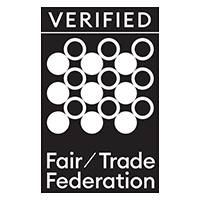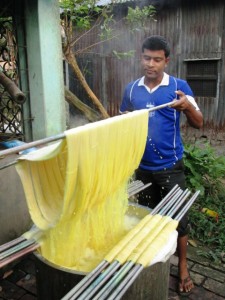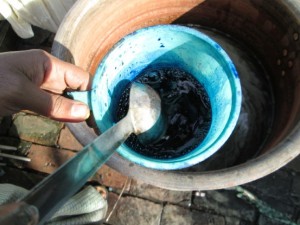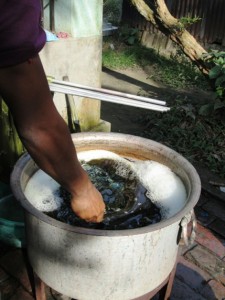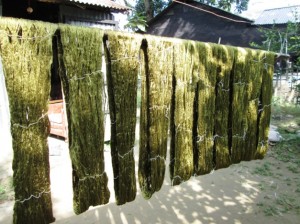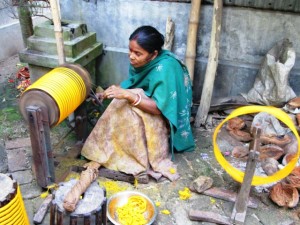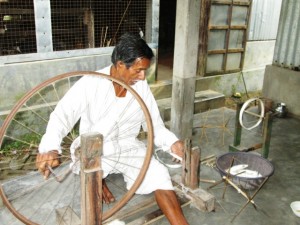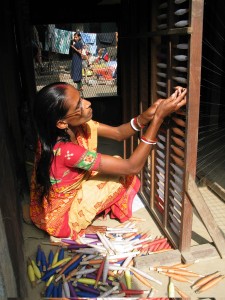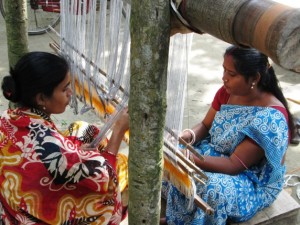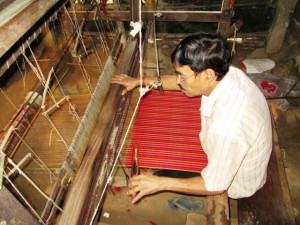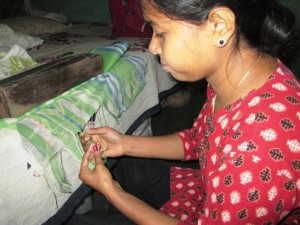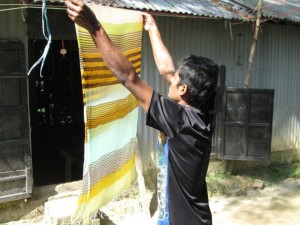The Making of a Sevya Fair Trade Scarf
Sevya’s hand-woven scarves and shawls are entirely handmade and each piece is the beautiful culmination of a process that involves many intricate steps, each performed by an artisan who is highly skilled in their craft. The entire process is done by hand and without the use of any electricity, which means that there is very little carbon footprint involved and many people are able to earn a sustainable livelihood from this handiwork.
The first step in this process is starching and degumming the yarn. For cotton scarves, the yarn is first starched so that it is easier to weave on the pit looms. This starch solution is made from rice that is boiled in water. For silk scarves, the silk yarn is first degummed, which allows for the threads to be more easily separated and aligned properly for the loom.
Once the yarn is starched or degummed, it is sent to another group of artisans for dyeing. These artisans are masters of preparing and fixing the dyes, and it is done over a wood fire. The yarn is repeatedly boiled in the dye mixture until the exact color is attained.
After dyeing, the yarn is hung on lines outside in the sun for drying.
Once it is dry, the fine yarn is rolled onto a small barrel using a spinning wheel. Women typically do this stage of the process, as it is something they can easily do in their own homes in between other household work.
These small bundles of yarn are then reeled onto bobbins using a spinning wheel or “charkha” and a bicycle wheel. Both men and women are involved in this step of the process.
Once the bobbins are made, they are arranged in a tall wooden frame as per the design of the scarf, and the threads are then connected to the drumming barrel.
The warp of the scarf is then set on the drumming barrel and the fine yarn is combed and netted so each thread is separated for the hand-weaving process.
The loom is then set and the weaver uses a combination of foot pedals, throwing the thread shuttle, and hand levers to adjust the weft as per the design of the scarf. These artisans come from a long lineage of master weavers and have tremendous skill and knowledge in their craft. Only they possess the skills required to make such intricate and delicate weaves using these fine natural yarns.
Once the scarf is woven, it is removed from the loom and an artisan braids the ends to create the beautiful tassels.
The final steps are washing the scarf in multiple washes to remove any starch and to bring out the inherent soft texture of the natural yarns. The scarf is then ironed, packed, and ultimately delivered to many shops throughout the world. It is a rich and beautiful process, involving many hands and hearts and sharing the ancient hand-loom traditions of India with people around the globe.
Sevya’s fair trade, handmade scarves are more than beautiful fashion statements—they are a vital link to our human heritage of respecting and communicating what is sacred through art. Each handmade scarf is a treasure that conveys what is real and lasting, and is vital to the well being of our planet and our selves. We honor this treasure every time we wear one of these beautiful handmade scarves.

